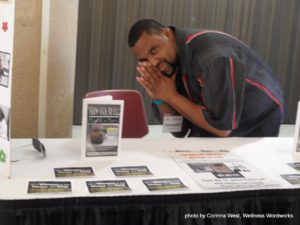A mental health social entrepreneurship is a business that uses market principles to maximize benefit instead of maximizing profit. For instance, my business, Wellness Wordworks, works to show that emotional distress is temporary. One of our programs, tentatively called Connect Power, will be a website that creates mental health care that people in distress can afford themselves instead of relying on government or charity funding.We’ll accept either cash or bartered volunteer time.If you want to help design the problem, we’d love your input on our design survey: http://www.surveymonkey.com/s/FSWMCF3
Social entrepreneurship creates dignity, a sense of investment, empowerment, additional social connections, career opportunities, and hope for our customers. It also allows our business to grow nationwide within a couple of years. It’s time to explain more about the social entrepreneurship approach.

Wikipedia says, “Social entrepreneurs are people who have noticed a need in their community or somewhere in the world, and have come up with a way of remedying that issue. The remedy could be creative, innovative, “out of the box,” etc… since most entrepreneurs tend to think in this manner. In general, social entrepreneurs did not start out with the goal of making money, but in the long run, switch to a for-profit business. Also, the majority of social entrepreneurs are faced with an issue in their youth that motivate them to do something about it in adulthood, such as poverty, sanitation, etc…”
It turns out that some models of business are more effective at solving social problems than others. Here is our explanation of how Wellness Wordworks fits all 12 design principles for mental health social entrepreneurship. Mohammed Yunus, the founder of Grameen Bank, earned a Nobel Prize for helping to halve poverty rates in his home country of Bangladesh using microlending. He says in his book, Creating a World without Poverty, that social entrepreneurship may be the ONLY way to fix the entrenched health care problems in the United States:
For example, the 47 million people in the US who are not covered by health insurance could be a fertile market to be served by well-designed, innovative social businesses. This is the only organizational structure that eliminates the enormous economic drain represented by corporate profit-taking while retaining the beneficial personal and business incentives created by competition in the marketplace. Freed from the pressure to compete on Wall Street, a social business that offered health insurance to the poor would not feel driven to drop the sick or elderly from its rolls, or to deny coverage for costly medical treatments, in order to boost its profit margins. Instead, its mission would be to focus on formerly unreached customers while generating sufficient income simply to cover its expenses.
Examples of Mental Health Social Entrepreneurs
Social entrepreneurs can be found all over the world, in most industries, and where the need is the most pressing. Some social entrepreneurs promote older disease model thinking, but most are very up to date and show current empowering approaches. Most of these profiles come from Ashoka Foundation Fellows.

- Colon Cristobal founded La Fageda, a dairy in Italy that provides housing, work, and peer support opportunities for people with disabilities. La Fageda is a cooperative of 280 workers, of which 160 have been labeled with some form of “mental illness” or handicap. The dairy production centre is owned by the workers, who become shareholders by paying €60 upon entry. La Fageda also has a support programme comprised of a group of psychologists who follow each worker’s personal and professional rehabilitation. This support group oversees the residential halls where workers without families stay, as well as the occupational centre for those with the greatest level of theoretical incapacity. (However, it’s possible that residential care is an outdated model.)
- Kedar Ranjan Banerjee founded the National Institute of Behavioral Sciences in India. Kedar is evolving a series of awareness programs that promote community and family participation in organizing mental health services, especially in non-elite neighborhoods. They encourage people to move from embarrassed and fearful reactions that isolate the ill, be they still living in the area or relegated to an asylum, to integrating them in daily life and helping with care and rehabilitation. His work is overwhelmingly focused on the rapidly growing drug epidemic, a plague for which society now has almost no organized response. Kedar believes this epidemic provides an excellent entry point to develop and build understanding for his non-custodial, involving approaches, which he would ultimately like to see applied more broadly in the mental health field. (Again, this approach relies on labeling and “treatment,” but shows several innovative approaches.)
- Adalberto Barreto in Brazil founded a Community Therapy approach that shows how health professionals are not necessarily the primary resource to tap into to treat diseases. Yet, many diseases in developing countries are a consequence of marginalization and poverty. Through this methodology, now used all over Brazil, he has proved that most people who suffer from emotional and psychological troubles in favelas can be treated by the community itself, thus significantly reducing the need for medical treatment. More than three million people have participated in his sessions, and 88 percent of them have successfully overcome their problems through community therapy. Adalberto aims to develop community health indicators that will increase adherence to his model and is now looking to disseminate his methodology throughout Latin America and Africa. (Using lay people instead of expensive professionals is common for social entrepreneurs.)
- Vicki Bernadet in Spain founded FADA (in Catalan means Fairy Godmother)—the only organization in Spain that provides support to adults sexual abused during their childhoods. FADA helps renew self-esteem and psychological stability to those still recovering from traumatic experiences. While she provides support and care to adult victims of sexual abuse, Vicki understands that preventing sexual abuse among children is just as important. Only when society recognizes and confronts this problem can many victims cease being inhibited by shame and guilt and begin to seek help. (This is looking at the root cause of a problem, key for many social entrepreneurs.)

Corinna West modeling a digital poem collage during her mental health social entrepreneurship launch phase - Ricardo Lopez in Bolivia brings family, medical staff, patients, and former patients together in joint musical activity. By encouraging all individuals to participate as equals, Ricardo’s approach touches patients in a nonthreatening way. The community therapy breaks down existing vertical relationships, opens patients up to other therapies to facilitate recovery, and better prepares patients for reintegration into their families and society. The social-leveling effect of making music together is empowering for patients and builds self-esteem and hope for rejoining their communities. Ricardo’s approach is low-cost, easy to implement, and easily transferred across a wide spectrum of institutionalized populations. (Breaking down barriers is common for social entrepreneurs.)
- Paul Rieckhoff – is building a twenty-first century, non-partisan veteran’s organization, using social media tools to organize and mobilize veterans of the wars in Iraq and Afghanistan and bridge the disconnect between veterans and the general population. In a time when less than 1 percent of the population serves in a volunteer military, most Americans have no personal connection to service members or veterans. As a result, veterans often suffer the personal effects of combat in silence, and the country does not reap the benefit of their expertise on military and other issues. Through Iraq and Afghanistan Veterans of America (IAVA), Paul is changing this dynamic by equipping veterans in real time with information about resources they need to manage the transition back to civilian life and become leaders in their communities. The result is not just better care for veterans, but a population that is more thoughtful about future military conflicts because it better understands the causes and consequences of war. (I told you we needed to talk about more home grown models.)
- Jerry White – When a 20-year old Jerry White stepped on a landmine on a weekend camping trip in Israel and lost his left leg, it would have been easy to remain a victim. However, Jerry chose life, not death, and not revenge. He literally stood up and committed himself to creating a world in which victims do not exist; one in which survivors thrive. Since 80% of the victims of war are civilians, it is essential than civilians stand up in the effort to end war. Jerry created the Survivor Corps network, which utilizes the power of partnerships, community, and leadership to bring issues of justice, human security, reconciliation, and inclusive development to the forefront of international decision-making. Survivors of conflict recover through peer support, rebuild through collective action, and reform through advocacy, creating policy reform and public awareness that cycles back into the original purpose of breaking the vicious cycle of victimization and violence throughout the world. Indeed, Survivor Corps is the only worldwide network that supports survivors of conflict. (Again, resolving the root cause of the problem.)















Great stuff, really an important story to be told and an important possibility to callforth. And, I would suggest that as with any new thing (which this isn’t actually, but is)defining it, its parameters gets a little skecthy. from my experience what distinguishes ” social entrepenuerism ” from straight up biz or social service is that it is business… absolutely and certainly and in everyway. Business that is profit driven and value-centered, meaning it produces valuable social service as well as profit. Its a non co-dependancy producing, model of provinding services and filling gaps that funds itself… not from charitable or governmental sources but from the profits produced in the market place. As the model gains popularity its become a little blurred… to its long term detriment perhaps. An example of which is occurring in the micro-lending realm as its usefulness and profitability are drawing all sorts of new twist and growing pains into the mix. If it ain’t about profit you ain’t really in the mainstream biz game and you sure ain’t self sustaining or viable in that. its not straight up entrepenuerism. Indeed that is the critical distinction that makes this approach so vital and valuable. its the no more begging approach to funding good work. and after begging and pleading and granting and pleading for years … I love it, and the blurriness spooks me.
Report comment
Yes, business ethics are an important concern, and there is a lot of variation in social entrerprise. It ranges from “ethical” for profit business like Ben and Jerry’s or Whole Foods or Seventh Generation cleaning products. On the other end are more grant based businesses that have some earned income. I plan to define my business according to Mohhammed Yusuf’s definition of social business, where no dividends are ever paid to shareholders.
I also plan to certify as a B corporation, B for benefit, which is available currently in 6 states. This process rigorously takes into account the corporations impact on customers, employees, community, and other stakeholders. http://www.bcorporation.net/
Report comment
I request you to future our Heartsounds Uganda initiative as a social entrepreneur project. You can interview me on this please.
Report comment